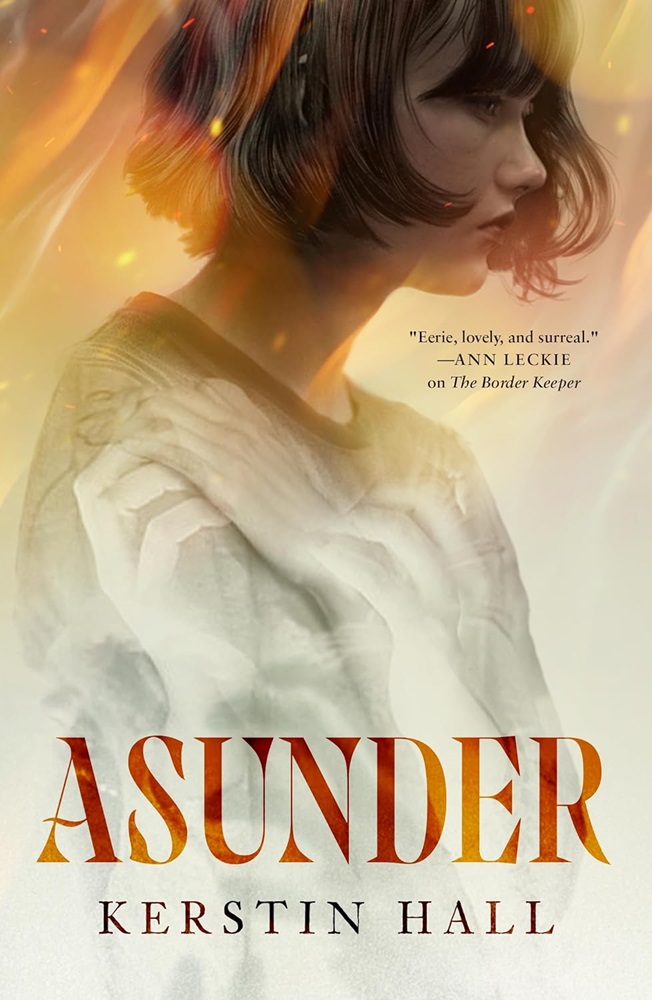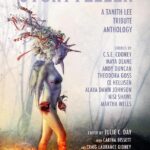
Genres: Adult, Fantasy, Secondary World Fantasy, Queer Protagonists
Representation: Bi MC, secondary F/F
Protagonist Age: 29
PoV: Third-person, past-tense
Published on: 20th August 2024
ISBN: 1250625424
Goodreads

"Eerie, lovely, and surreal."—Ann Leckie on The Border Keeper
We choose our own gods here.
Karys Eska is a deathspeaker, locked into an irrevocable compact with Sabaster, a terrifying eldritch entity—three-faced, hundred-winged, unforgiving—who has granted her the ability to communicate with the newly departed. She pays the rent by using her abilities to investigate suspicious deaths around the troubled city she calls home. When a job goes sideways and connects her to a dying stranger with dangerous secrets, her entire world is upended.
Ferain is willing to pay a ludicrous sum of money for her help. To save him, Karys inadvertently binds him to her shadow, an act that may doom them both. If they want to survive, they will need to learn to trust one another. Together, they journey to the heart of a faded empire, all the while haunted by arcane horrors and the unquiet ghosts of their pasts.
And all too soon, Karys knows her debts will come due.
I received this book for free from the publisher via NetGalley in exchange for an honest review. This does not affect my opinion of the book or the content of my review.
Highlights
~who needs trains when you have spiders?
~sell your soul, become a saint
~falling in love with your own shadow
~there used to be not-gods, now there’s new not-gods
~you can run, but can you hide?
Asunder is velvet and dust and the softest ashes, salt and copper and crystal. It is twilit. It whispers. It has sharp edges. You must hold it very carefully as you read, or it will slice your fingers open to the bone. When you are finished, you will have its teethmarks on your heart.
It is a treasure.
The task of describing Asunder demands poetry, because mere prose can’t possibly capture the scintillant brilliance of Hall’s writing. I want this book tattooed on my skin. I want to wear it and breathe it and have it with me always; I want it wrapped around my fingers so I can punch it into people’s faces. It’s soft and brutal, clear and secretive, straightforward and intricate. It is dazzlingly original and quietly subversive, magical and horrifying, beautiful and heartbreaking. It hurts, and I want it to hurt me again.
I wanted to turn back to the first page the moment I finished the last, and the second I’m done with this review, I will.
Hall has, yet again, created an impossibly impressive world so real that you can feel its wind on your face, so strange that it feels like a dream, conveyed to us through prose both sharp and somehow delicate, a Fabergé egg with razors inside. It’s a world shaped by otherworldly conflict, but not in the way you might expect; our main character Karys doesn’t wander through a landscape bearing the scars of undivine war, but her culture, and the geopolitical history of her world, are inextricably entwined with the rise and fall of different…pantheons, families, species?…of not-gods. The once-mighty Vareslain empire has fallen, bereft of the nod-gods who once favoured it; Karys’ native Mercia is currently rising in prominence as the bastion of the Ephirite, who slaughtered the not-gods who came before them. The miracles of the deceased Bhatuma linger alongside those of the newer Ephirite, both fulfilling vital services for mortals – everything from public transport to the postal system are the workings of the undivine, or derived from those workings. The result is a setting both dream-like and nightmarish to the reader, but which the characters living in it see as perfectly normal, a dissonance that adds only adds to Asunder’s lustre.
It’s also, brilliantly, a world you have to discover for yourself. I’m used to a certain amount of telling in the books I read – which is fine; it’s only when there’s too much of it, or it’s done clumsily, that it’s a problem. The ‘show don’t tell’ rule is, like probably every writing rule, only applicable some of the time – it’s not a sin to ‘tell’ the reader things! But Hall has taken the rare approach of barely telling us anything at all; instead it’s up to the reader to note and gather together every clue, every fragment of lore, every scrap of backstory, and piece them together – and we very rarely get clear confirmation that the picture we’ve made is the correct one. Puzzling out the history of the Bhatuma, the dead not-gods, and their relationship with different humans and countries, involved a fair bit of reading between the lines, drawing inferences from other bits of the worldbuilding – and yes, I can see some readers being a bit frustrated by this, but you know what, I loved it. It’s somehow incredibly immersive, makes it feel like a real world, because in real life there are no info-dumps, you have to learn by experiencing, and that’s very much what reading Asunder is like. None of the worldbuilding feels vague; I’m absolutely convinced that Hall has all the details worked out, has thought all of it through, because everything fits together perfectly, no matter how deep you dig at it. Hand-wavey worldbuilding doesn’t do that; you only get this kind of neat precision when a storyteller knows their world inside-out and backwards, and it’s obvious that Hall really does.
The setting is distinct and vivid, a character in its own right – and the rest of the cast is equally marvellous. Karys herself, our main character, is sharp and brittle and sort of grimly hopeful, stubborn but not at all stupid. Her wariness of the world transfers brilliantly to the reader; she’s closed off from us at first, keeping her secrets to herself, and opens herself up to us only slowly. There’s a clear sense that we have to earn her trust before she’ll reveal herself fully – that only by going through her travails at her side can we l/earn who she is. It’s not so unusual for a character to be keeping secrets from the reader, but I’ve never seen anything like this before; the effect it creates is that of lingering over something unspeakably precious, being patient because it would be criminal to rush and not appreciate it properly. By the time we get to really know Karys, we’re honoured to be allowed to know her.
“I was trying to apologise, actually.”
“That’s new. I don’t think you’ve quite mastered the technique.”
She made a small, rude gesture with one hand.
“That’s not it either.”
“It’s all you’re getting now.”
The supporting cast honestly startled me by being so strikingly real, alive; every single one of them surprised me over and over, and like Karys, they all have hidden depths, so many layers and facets to who they are. It’s very rare for me to care about every major character, but I did here, because all of them are driven by vital passions or interests or secrets that make them so much more interesting than most people, vivacious and vivid even when they were trying to blend into the background! Ferain, whom Karys rescues, is funny and compassionate and desperate, bright as a light in the dark – and even the most minor of characters feel fully realised, so that you know they have their own, full lives happening just out of sight, that they existed before the first page and will continue to exist after the last.
To say nothing of being impossibly relatable, even the deathspeakers and mobsters and–!
“Why is it so . . . morning?” she mumbled.
Not only is nothing about Asunder predictable, Hall subverts the story structure that seems to have become the norm lately: instead of a three-beat narrative, A->B->C, Hall gives us a book that spirals in on itself, a plot that buds new adventures like rich flowers. Within the overarching plot that is rescue Ferain are multiple mini-plots, side-quests, and instead of distracting from the ‘main’ story, they complement it. Like branches of filigree they entwine to make something lovelier and more exquisite than they would alone; like rose vines, the spin-off growth feels entirely natural, not forced. None of them detract from the tension and urgency of Ferain’s situation – they’re all tense and urgent in their own right – and yet, they feel like a reminder to breathe, to pause, to savour instead of hurrying to the next page. They make Asunder into something decadent and luxurious, give us another reason to delight in it, without ever feeling slow or dragging things out. The pacing is perfect on every front, and the prose is sublime, all steel and silver. I lost count of the number of passages I wanted to wear like jewellery.
“Sometimes the places that you love grow teeth. Sometimes, home can swallow you. And even if that hurts, losing it still seems worse–because what if you let go and never find a better place? What if there’s nothing else?
Asunder defies categorisation: it’s not an adventure or a romance or a horror, it’s not a quest-story, it’s not a mystery – but it has adventure and love and horror in it, there are quests, there are mysteries. It’s grim without being grimdark, hopeful without being hopepunk, a single book* richer than a trilogy. It’s the kind of rare, weird, inexplicable gem you find buried at the back of someone’s attic, or in a secondhand bookshop no one’s ever heard of, or at a garage sale for a house that doesn’t exist – but it’s being traditionally published, will be on the shelves of places like Barnes & Noble and Waterstones next week. It’s an impossibility and a contradiction and a marvel, a nonpareil the like of which is seen maybe once a decade, if we’re very, very lucky.
It is easily – easily! – one of the best books of the year.
Don’t miss it.
*but not a standalone!






Leave a Reply